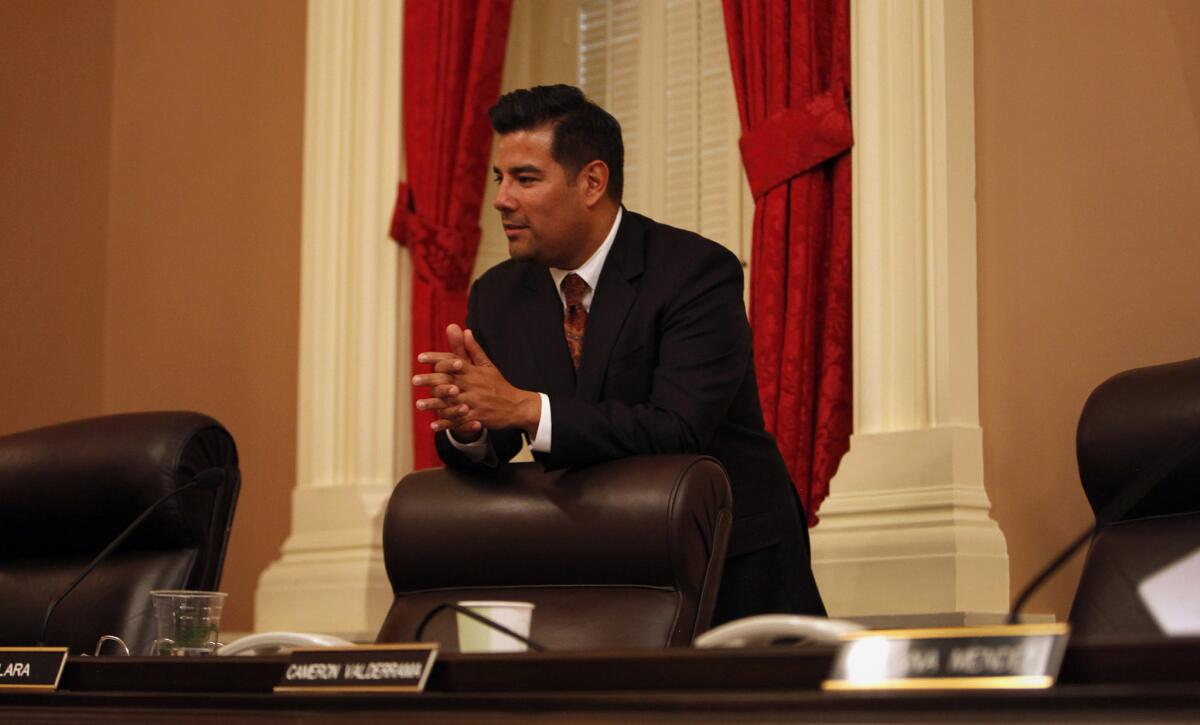Opinion: Will the Legislature inadvertently invite more medical tourists?

Sen. Ricardo Lara (D-Bell Gardens) has written a bill that seeks to extend insurance coverage to more people who are living in the country illegally.
- Share via
California is already a magnet for birth tourism. Now, health analyst Robert Laszewski writes, the California Legislature could make the state a magnet for medical tourists who sign up for insurance, get an expensive procedure done at one of the state’s famous medical centers, then drop their coverage and head home.
It’s a powerful critique, but Laszewski downplays one important fact: Foreign nationals can do that already, and not just in California.
At issue is SB 4 by Sen. Ricardo Lara (D-Bell Gardens), which seeks to extend insurance coverage to more people who are living in the country illegally. Among other things, the bill would have the state seek the federal government’s permission to let any consumer buy coverage through the state’s insurance exchange, Covered California.
The bill passed the Senate but has been amended in the Assembly and awaits further action there.
SB 4 doesn’t try to lift the Affordable Care Act’s prohibition on insurance subsidies for newly arrived immigrants and those living in the country illegally. Nevertheless, Laszewski argues, the measure would open Covered California to foreigners who could afford to pay the premiums on an unsubsidized policy just long enough to undergo whatever procedures they need.
Yet medical tourists can already obtain policies in the United States directly from insurers, through agents or through private comparison-shopping sites online. They appear to be doing so, too. According to Stephen M. Shivinsky, a spokesman for Blue Shield of California, his company has seen “a large increase in the number of Asian applicants who are coming to California and attempting to apply for coverage under tourist visas.”
The source of the problem is in the 2010 law, not Lara’s bill.
The ACA requires insurers to offer coverage to all applicants and to charge people with preexisting medical conditions the same premiums as those who are healthy. The downside of that approach is that it gives people an incentive to sign up for coverage when they’re sick or injured and drop it when they’re well.
To guard against that kind of gamesmanship, the law requires all adult Americans to maintain insurance coverage or pay a tax penalty. It also requires those who need insurance to sign up during limited “open enrollment” periods in the fall, with an exception for those who lose their coverage because of a job change or other major life event.
But while insurers have to offer insurance to everyone, those who are in the country illegally are not subject to the insurance-buying mandate or the tax penalty. The main protection against them gaming the system is the limited enrollment period. Insurance companies also demand proof of residency from applicants, which deters tourists in hotel rooms from obtaining coverage. Yet in at least some cases, they don’t require proof of long-term residency. That leaves the door open for medical tourists to qualify for coverage just by signing a short-term lease on an apartment.
Laszewski acknowledges this, but says opening Covered California to any and all consumers in the state will only increase the abuse. “Exposing all of this may be a better argument for closing that loophole than expanding, facilitating, and promoting it through Covered California,” he wrote on Forbes.com.
Insurers certainly shouldn’t be forced to provide coverage to medical tourists. On the other hand, it’s a good idea to extend insurance coverage to more of the people who are living here -- and who often receive care in the least efficient, most expensive fashion possible.
The trick is to give healthy immigrants in the country illegally a powerful incentive to obtain coverage, rather than waiting until they need care. One possibility would be to delay by six months or more the availability of insurance for anyone who does not sign up for coverage as soon as it becomes available -- 2017, if the administration grants the state’s request -- and maintain it continuously thereafter. Another would be to require immigrants who aren’t longtime legal residents to carry a policy with limited benefits for the first year or more before making comprehensive coverage available.
Lara could add such provisions to his bill, but this is an issue that extends far beyond Covered California. Besides, the folks most likely to take advantage of the Lara bill are the many who share their households with legal residents who already have access to coverage through the exchange. The bill would make it simpler for them to obtain coverage, although no less expensive.
Anthony Wright of Health Access California, an advocacy group that supports SB 4, doubted that the bill would elevate California above the low-cost countries that are drawing medical tourists now, such as India and Thailand. And even if it did cause an uptick in people getting insurance briefly for one-time treatments, he said, such blips aren’t a driving force in healthcare costs. Instead, the main factor has been chronic conditions such as diabetes and heart disease that require continuous treatment.
For the record, The Times’ editorial board backed the Lara bill.
Follow Healey’s intermittent Twitter feed: @jcahealey
More to Read
A cure for the common opinion
Get thought-provoking perspectives with our weekly newsletter.
You may occasionally receive promotional content from the Los Angeles Times.











